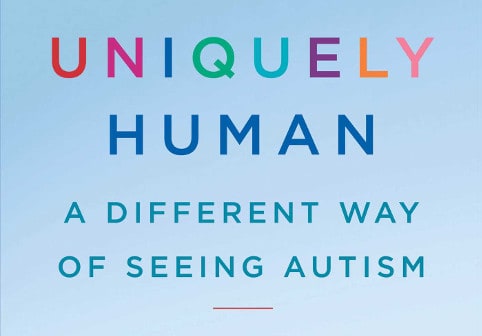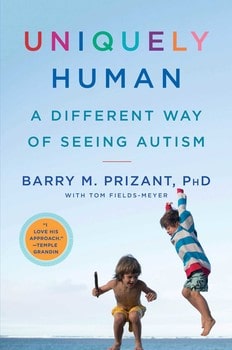Better Understand Autism with Help from Dr Barry Prizant’s New Book: Uniquely Human

Dr. Barry Prizant has been a researcher, clinician, consultant, and has received ASHA’s highest recognition. We have been lucky enough to hear him speak several times as part of the SPED Ahead webinar series from PresenceLearning. He has recently written “Uniquely Human: A Different Way of Seeing Autism” (with Tom Fields-Meyer, an author and father of a son with autism), which will be available in early fall 2015. Released by Simon and Schuster, this book is sure to be a landmark read on autism and a guide for better understanding individuals with autism.
Uniquely Human is organized around the stories of people that Dr. Prizant has worked with throughout four decades in the field. It is these personal stories that help frame a series of concepts that help us all to see autism in a different way, thus providing better support. Prizant describes his central message in the introduction:
The behavior of people with autism isn’t random, deviant, or bizarre, as many professionals have called it for decades. These children don’t come from Mars. The things they say aren’t— as many professional still maintain — meaningless or “nonfunctional.”
Autism isn’t an illness. It’s a different way of being human. Children with autism aren’t sick; they are progressing through the developmental stages we all do. To help them, we don’t need to change or fix them. We need to work to understand them, and then change what we do.
Understanding Autism
The first part of Uniquely Human dives into what it means to truly understand autism. Prizant highlights the importance of asking why, the value in listening with intention, and how enthusiasms and interests can build connections. He takes the reader through the experience of trust, fear, and control for individuals with autism and identifies 5 ways to build trust. He explains the impact of emotional memory and how prior experiences and memories are connected to behavior, and he dives into the challenges for people with autism in navigating the social world.
Within each story, it is clear that part of understanding autism is finding more similarities than differences between ourselves and those with autism. For example, a tendency for verbal people with autism is to repeat words, phrases, and sentences. This defining characteristic is known as echolalia and is often the first indication to parents that their child may have autism.
Prizant spent a year studying echolalia. He recorded 25 videotapes of children during their everyday activities. He identified and categorized over 1000 distinct echoes. What did he find? The children were communicating in a variety of ways through their echoes. Some were acknowledging what they heard, others were emulating conversation by taking turns, some were rehearsing for something they may say in the future, some repeating sounds that they found calming (Prizant compares this to chanting a mantra), and some were simply taking themselves through a process aloud to reassure themselves. “In other words, they were using language for the same purposes we all do. We just had to listen, observe, and pay attention.”
Living with Autism
The second half of Uniquely Human takes a more action oriented approach and shares insights into how we can all better support students with autism. Part of this requires looking into those who seem to “get-It” and those who don’t. Importantly noted by the mother of a young man with autism when asked about the qualities they look for in individuals that are working with their son. “The people we valued the most were the ones who never judged us, but they joined us on the journey.”
Particularly inspiring is Prizant’s highlight on the “real experts.” He shares how Ros Blackburn, Michael John Carley, and Stephen Shore have helped him (and countless others) better understand autism.
Ros Blackburn: Diagnosed with autism as a small child, Prizant describes Ros as “playful, quirky, mischievous, unique — and full of surprises (not to mention passionate about the movies she loves).”
Ros is also clear about how parents and professionals can best help in those situations, when a person with autism is panicked or anxious. “Don’t put your hands all over me, and don’t talk a lot to me,” she says. “Support me in silence. Support me with your presence.”
Michael John Carley: An accomplished playwright, a star baseball pitcher, a talented guitarist, and a host on a local NPR station, Michael was diagnosed with Asperger’s syndrome just a few days after the diagnosis of his four-year-old son.
He is determined to share with others on the spectrum the insight that so transformed his outlook when he received his own diagnosis: that many of the painful experiences they have endured in life have an explanation that is not rooted in their character but rather in their wiring and others’ unhelpful reactions.
Stephen Shore: Stephen was diagnosed in 1964 as too “sick” for outpatient treatment and recommended to be institutionalized. His parents chose to go a different route and began developing and implementing a program based on their own instincts. Stephen is now an author, holds a doctorate in special education, teaches at Adelphi University, and even advises nations on public policy regarding disabilities and has spoken on a panel with Dr. Prizant at the United Nations.
As an adult, Stephen has dedicated his life to helping people with autism and their parents conquer those obstacles and build fulfilling, productive lives for themselves.
Uniquely Human shares dozens of engaging stories, experiences, and perspectives that collectively share a storyline of understanding autism on a different level — one that has not been typically told. This book challenges the idea of a behavioral-assessment approach, where one is focused on a checklist of deficits and thus defines the child (or adult) based on these behaviors. Doing this misses the mark by devaluing the individual and their experience. Instead, Uniquely Human encourages us all to respect perspective and experience. It encourages us to ask questions and build relationships. It emphasizes that rather than focusing on changing the person with autism, “the best way to help a person with autism change for the better is to change ourselves — our attitudes, our behavior, and the types of support that we provide.”
Uniquely Human: A Different Way of Seeing Autism is currently available for pre-order here.
Listen to Dr. Prizant talk more about new approaches to working with those on the spectrum and answer questions during PresenceLearning’s most recent webinar, Uniquely Human: A Different Way to See Autism and Create Pathways to Success.
For more blogs my Megan, check out:
- Telepractioner: Providing the Next Generation of Student Support
- Personalize Learning with Buzz from Agilix
- 5 Teachable ‘Deflategate’ Moments: Connecting Football to STEM




Catherine
Great review. I had the chance to interview Dr. Barry Prizant about his book uniquely human on The Autism Show Podcast http://autismshow.org/uniquelyhuman
Bridgette
It's hard to find experienced people about this subject,
however, you seem like you know what you're talking about!
Thanks